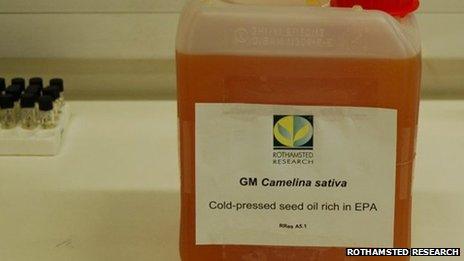'Fish oil' GM plant trial application submitted
- Published

An application to conduct field trials of a genetically modified crop containing Omega-3 fatty acids normally found in oily fish has been submitted.
If approved by the government, the trials could begin at Rothamsted Research agricultural institute in Harpenden, Hertfordshire, this year.
The initial aim of the crop is to benefit the fish farming industry, the researchers said.
But in a decade it could end up in food products, such as margarine.
The scientists at Rothamsted Research - who have been working on the project for 15 years - modified seeds from Camelina sativa (false flax) plants using genes from marine algae - the primary organisms that produce the fatty acids.
By substituting synthetic versions of up to seven genes from marine algae, the researchers have engineered Camelina plants to produce two key Omega-3 fatty acids normally obtained from oily fish, EPA and DHA.
Both are said to have important health benefits, including protection against heart disease.
Fish oils
Lead researcher Prof Johnathan Napier said: "The next really exciting challenge for us is to say, 'We know it works in the glasshouse. Does it work in the real world?'

2.5 Litres of GM Camelina oil
"We have applied to Defra for permission to carry out a field trial."
If the regulatory hurdles are crossed, the first crop could be sown in about three months.
Plants such as flax and linseed contain Omega-3 fatty acids, but they are not the same as the long-chain compounds in fish oil.
Oily fish such as tuna, mackerel, and sardines do not produce long-chain Omega-3 fatty acids naturally either.
They only obtain them by consuming certain types of marine algae and the molecules then move up the food chain.
Currently, farmed fish are given fish oil, rather than feeding on the algae, in order to get their Omega-3.
About 80% of available supplies of fish oils are taken by the industry as a result.
The Rothamsted Research scientists believe genetically modified plants like Camelina have the potential to make fish farming more sustainable and ease the pressure on wild fish populations.
Prof Napier said he doubted Omega-3 supplements would be a "natural market" for fish oil nutrients produced from GM plants.
But he said he could imagine the fatty acids being incorporated into food products such as margarine.
"By the end of this decade, there's a possibility that people will be able to obtain a GM plant-based source of fish oils," Prof Napier said.
- Published9 January 2014
- Published26 October 2013
- Published6 September 2012